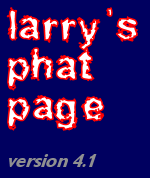 | |||||||||||||||
|
 |
|
10:08 am EDT 78°F (26°C) in Hackettstown, NJ
Calendar of Updates | My newest obsession seems to be Texas Hold’em, the version of poker that has become very popular in the last several years. It was only three months ago that Marc taught me how to play that game, but now I’m really taking every opportunity I can get to play and try to improve my skills. I have recently downloaded both the PartyPoker.net and Bodog applications, and I played several play-money “sit and go” matches over the weekend. (No, I don’t do the real-money sites that require a credit card — this is entirely for fun.) (For purposes of explanation, “sit and go” refers to a match that starts with up to 10 players with equal chip stacks and proceeds until one player has won all chips — there is always a fixed, finite number of total chips in play, which is what differentiates a “sit and go” from a table where people can come and go at will and the total chip count fluctuates as players enter and leave. For what it’s worth, any real tournament involving face-to-face play really has to be of the “sit and go” type; you can only find the enter-and-leave-freely style of poker on the online sites.) There are so many variables to consider in Hold’em, and that’s what really makes the game so fascinating to me. You have to keep your “position” (place in the betting order) in mind, because it affects what starting hands you can play and even whether you should bother seeing the “flop” (first three community cards laid face-up on the table). You also have to consider the number of players at the table; you can play a lot “looser” (play some more hands of marginal quality) with only two people at the table than you can with 10. Of course, I haven’t even started to get into betting; there can be situations where you have to ask yourself whether you should make decisions based on your own cards or on your opponents’ bets and even their playing tendencies. (Do they bluff a lot, or do they tend to play their hands fairly “straight up”? Sometimes, knowing this can help you.) I read something on a poker web site that I later learned the hard way in game play: that the worst starting hand in Hold’em is not necessarily 7-2 off-suit, but rather the second-best hand. Ordinarily, unless you’re on the “big blind” (the blind bet that must be made by the player two seats to the dealer’s left, before that player can even be dealt his/her pocket cards) and everybody else only calls (makes a matching bet) that big blind, you fold 7-2 off-suit and suffer no damage to your chip stack; but when you have the second-best hand, often it looks good enough that you think it is the best hand. In one particular hand, I had pocket queens — the fourth-best starting hand in the game — and my lone opponent had ace-9 off-suit, so I should have had him dominated. In fact, I was looking good after the flop, but an ace came down on the “turn” (the fourth of the five community cards), giving him a pair of aces that beat my pair of queens. I didn’t get any help from the “river” (the last of the five community cards), and that was that. (Another couple explanatory notes: The “big blind” is called that to differentiate it from the “small blind,” which is a blind bet, usually in the amount of half of the big blind, that must be made by the player immediately left of the dealer. That is, starting with the dealer and going clockwise, you have the dealer, the small blind, the big blind, and then all of the other players who are not required to bet in order to receive their pocket cards. These other players, and the dealer for that matter, lose nothing if they choose to fold before the flop; however, in order to keep playing and see the flop, they — and the small blind — must bet at least an amount equal to the big blind. In “heads-up” poker (only two players remaining from a larger table, or starting with only two players), the dealer is the small blind and the non-dealer is the big blind.) It looks like I’m being sent right back over to Illinois again with my next load. Let’s see how long I can stay awake on the aforementioned four hours of sleep … |















